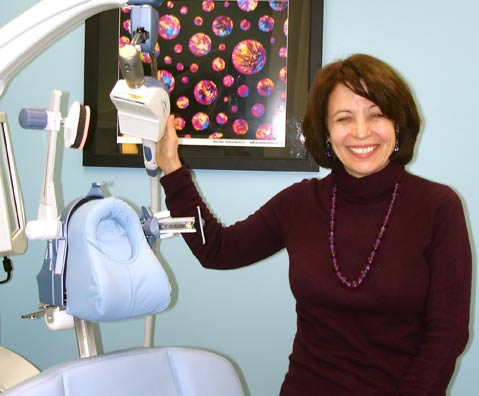Treating Depression Holistically
Dr. Denise Lin

Dr Denise Lin is a holistic psychiatrist and nutritionist who is opening her own practice here in Santa Barbara. I sat with her for an hour and learned about her goals and accomplishments as a doctor, including the use of cutting-edge Transcranial Magnetic Stimulation, which is being used to successfully treat depression. Here Dr. Lin offers insight into life and the practice of medicine.
How are you involved in healing? What aspects of healing do you specialize in?
As a psychiatrist I work with people who are suffering from emotional or mental disorders. These disorders are far-ranging, from schizophrenia or severe forms of bipolar disorder to various anxiety problems, adjustment reactions, attention problems, depression, and milder bipolar spectrum disorders. Some of my patients have combinations of psychiatric disorders plus substance abuse or medical problems. I perform the traditional role of a psychiatrist, which is to prescribe medications and perform therapy. However, I also include some other approaches. For example, research shows that the adrenal glands – which are responsible for the secretion of the stress hormone cortisol – can be dysfunctional in cases of anxiety, depression and suicidality. So I often test my patient’s adrenal hormone levels and review ways to correct them if they are not in the normal ranges. I also explore aspects of nutrition that relate to emotional well-being. I think people are becoming disillusioned with the heavy emphasis on medication as a solo treatment modality. I am excited by the fact that there is a growing body of evidence for the importance of nutrition and psychoneuroendocrinology (the clinical study of hormone fluctuations and their relationship to human behavior) in emotional well-being.
In addition, I have recently opened the only center for Transcranial Magnetic Stimulation in the Santa Barbara area. This is a non-invasive, FDA-approved treatment for depression that utilizes a powerful magnetic field to stimulate the brain. We are very excited to be able to offer this non-pharmacologic treatment to people in Santa Barbara who suffer from depression. TMS is so safe that it is currently being tested in pregnant and breast-feeding women who have depression.
What personal challenges or beliefs have led you to this path?
I took a circuitous route to medical school. I married soon after I graduated from UC Berkeley and I put off my plans for medical school because my husband had a dream of opening a bed and breakfast in Northern New Mexico. We pursued his dream for several years until I decided to refocus on my own career. When I began medical school I was 33 and had two young sons. We divorced one year later and I was a single mom during most of medical school and residency. Needless to say, it was tough and challenging, but I did well and my boys thrived. They are both attending UC schools and doing great.
I also experienced another painful loss the year before I began medical school. My brother, who I deeply loved and admired, committed suicide in 1994. His name was Blaine Snyder. He was 37 years old and had been working on his PhD in Economics. We had been very close growing up together in Santa Barbara. I was grief-stricken and had a lot of guilt about not having understood what he had been going through during the many years he struggled with depression. “If only I knew then what I know now…” – this thought still comes into my mind. I miss Blaine every day, and I can only try to honor his memory by doing the best work I can when people come to me who are in pain.
Talk about some of your teachers.
There have been so many. To just touch on a very few…I already mentioned my brother Blaine…There was my high school chemistry teacher, Mr. Patchen, who taught with humor and opened my eyes to science. In college, Dr. Bruce Ames for one, who inspired my interest in nutrition and toxicology. My best friend, Teresa Zuber, who taught me how studying for finals can be fun.…my husband Mike Marcotte who encourages me on my spiritual path….there were so many professors and role models in med school and residency, such as Stephan Lewis, Diana Quinn, Ann Gateley, Joel Yager, “Ule” Uhlenhuth, and John Lauriello. These people, among many others, taught me how to be a doctor, and how very important it is to practice with both scientific rigor and compassion. In addition, I would have to say that my patients have all been excellent teachers.
What would you recommend to someone who is considering studying medicine/healing arts?
Maintain compassionate detachment. Compassion is an integral part of the healer-patient relationship. However, becoming attached to a particular outcome, or to a certain treatment process, or to the patient liking you…these things are detrimental because they can cloud one’s judgment.
Also, spend time with healers you admire and soak up their wisdom.



